I almost didn’t go rowing yesterday. After spending too many long hours at my desk, I needed to get out of the house to clear my head. In the early afternoon, I studied the sky to the north through my home-office windows. Beyond the black filigree of leaf-bare tree branches, the sky was dimmed by a leaden overcast. The dull gray sky threatened rain and I balked at all the work it would take to get ready for a short afternoon row. I’d have to clear a path through scattered boxes and lumber to get the Whitehall out of the garage, gather foulweather gear, hook up the trailer and make sure the lights work, lubricate the locks and the oar leathers, and load a PFD and a fender aboard. I got busy and in about a half hour I was ready to drive to the ramp.
The last thing I had to do before I backed the trailer into the waters of Seattle’s ship canal was put the rubber stopper into the Whitehall’s drain. It slipped in easily enough, but when I flipped the lever to expand the rubber for a watertight fit, the plug was still loose. I adjusted it several times, hoping this outing would be worth the effort.
I didn’t need to wait long for the reward. The first three strokes left my lethargy in the Whitehall’s wake and returned me to a feeling of vitality that rowing had been giving me for decades. My hands had been at the keyboard and the mouse for days, and the pressure of the oar handles triggered in them an impulse to pull just as the pressure of a harness does to sled dogs and draft horses. I could feel the contact of the blades with the water not as vibrations of the handles in my hands but as if my sense of touch and proprioception extended to the blades themselves.
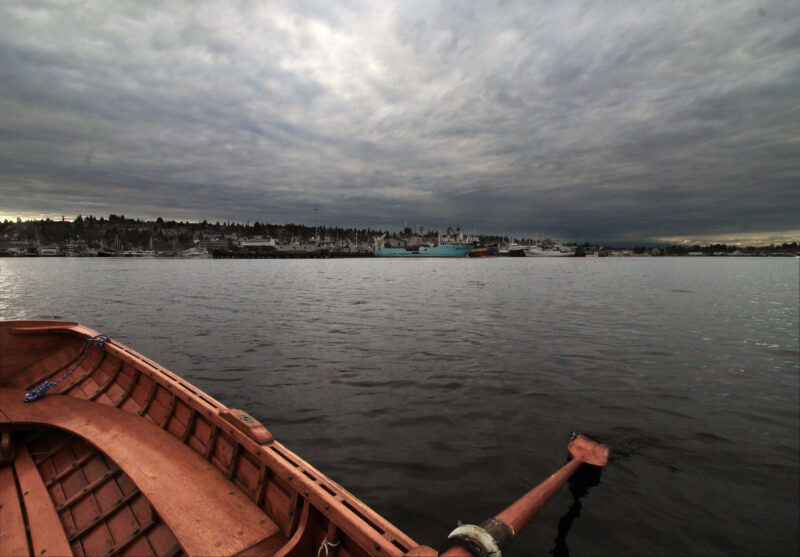
During the summer, the Lake Washington Ship Canal is crowded with recreational boats motoring between Puget Sound and the two lakes that surround Seattle’s city center. The waterway is a more peaceful place to row in the winter, when there is almost no boat traffic to steer clear of and the water is not deeply furrowed by wakes.
The sky to the north was just as gray as it was when I’d looked at the rectangular patch framed by the window sash, but the rest of the sky was an intricate tapestry of color, shape, and texture. To the west, resting on the sawtooth silhouette of peaks on the north end of the Olympic Mountains, was a smear of toothpaste-blue sky. Above it were clouds in a shade of gray that had a touch of lavender at one moment and then periwinkle the next. The expanse of overcast above was mottled pewter gray with darker patches the color of unpolished silver.
The sound of car and truck tires whined and growled in their varied pitches as they crossed the steel grating of the bascule bridge that spans the canal. A biplane flew by to the west, its radial engine making the distinctive rumbling that my mother, who had flown biplane trainers and multi-engine bombers stateside during World War II, always looked up for, as I have since childhood. The laps of the Whitehall’s planks gurgled with the lapping of the ripples. In the silence of my home office, hours can go by and all I hear is the clatter of the keyboard in front of me and the hiss of tinnitus inside my head. On the water I sat in the middle of an immense sphere brimming with sounds that gave depth and life to the space that surrounded me.
While I’m at my computer, I’m never aware of the air. It is stock still and even the lightest pieces of tissue paper lie lifeless on my desk for hours. I can hear myself breathe, but if I feel my lungs at all it’s their emptiness. Out rowing on this afternoon, the air leaves its mark everywhere. Flags are lifted and undulated, the water is rasped into ripples, my windward shoulder is chilled, and I feel the air’s chill, briefly, as it enters my chest and dissipates.
My father started me rowing when I was five or six years old, about the same time I learned to ride a bicycle. I’ve been rowing and riding with few interruptions since then. In my 60s I noticed the speed that I rode had gradually diminished. I didn’t have the power I’d once had for climbing hills, and the speed calculated by my bicycle speedometer confirmed I couldn’t sprint as fast as I’d used to. While my rowing speed surely must have diminished too, I don’t feel it and GPS readings give me numbers that don’t press home the somber news that I’m getting older.
My father, an oarsman and sculler for most of his life, rowed racing singles into his early 80s, giving up only when he had to accept that he no longer would have the strength to get back aboard after a capsize. My interests in rowing have always been for recreation and cruising rather than racing, and the boats I row take more than a moment of inattention at the oars to capsize. I expect I’ll be able to keep rowing into my 90s, if I get that far. But as more gray creeps into my temples and eyebrows with each passing year, it will be even more important to take to my boat and row into the brilliant light that comes through even overcast skies.![]()

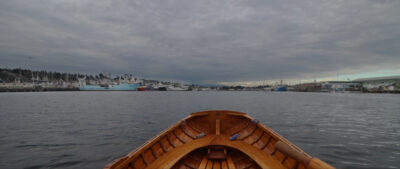

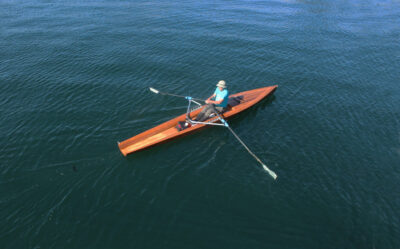
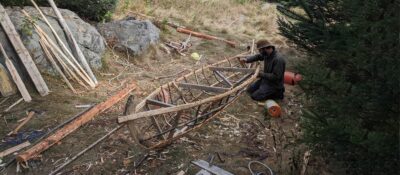
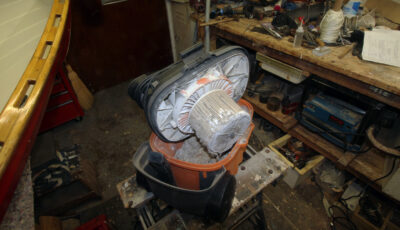
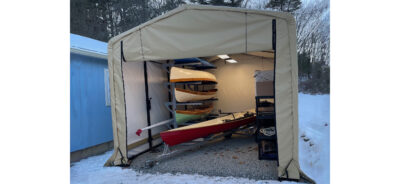
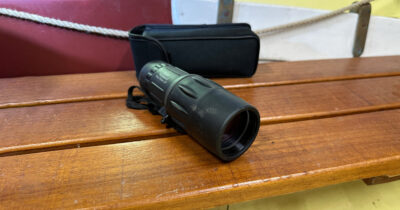
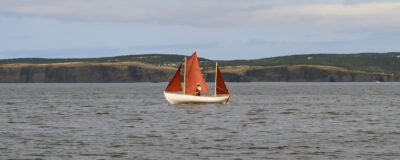
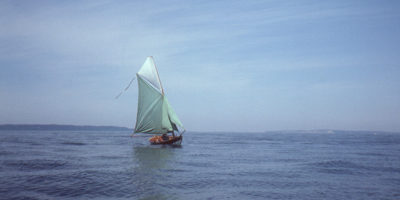
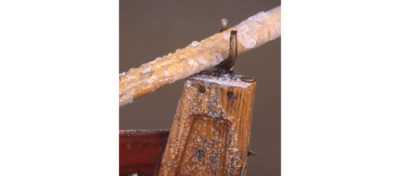


Thanks, Chris. You’ve recharged the corporal memory of settling into my kayak along Lake Union or the canal. While walking brings daily joy and release, longing for moving in the ‘yak is revived.
Peter
Uplifting editorial, Chris. Thank you. I hope you get another twenty or thirty years of rowing. I think I began rowing a heavy wooden Whitehall-type boat on BC’s Sunshine Coast at age 5 or so. I took it up again at age 40, rowing out of Santa Cruz Harbor onto Monterey Bay in Daisy, a 13′ fiberglass pulling boat. After about twenty years my back succumbed to the damage from a teen-age injury and I moved into my 14′ power dory. I am tempted every now and again to rig her for rowing and see what I can do.
Give in to the temptation! While you are getting the boat rigged, consider doing some core stabilizing exercises for rowers. A session or two with a trainer or physiotherapist can get you started, or you can consult Dr. Google.
Thanks, Andrew. I have done plenty of physiotherapy on my back and core over the years but am still nervous about rowing again. I will give it a try.
Still in Santa Cruz? I grew up around the Pajaro Valley, but live in the Midwest now. I discovered skin-on-frame construction a few years back, and the weight reduction has made all the difference to my body, battered by combination of sports and career (military and law enforcement) stresses. On top of that, I find skin-on-frame boat building even more fun than ever, if that were possible. Take a look at Dave Gentry’s offerings or Kudzucraft (Jeff Horton), as they seem to me to be the easiest way into this construction method. I will be visiting family and friends in October, though I won’t be bringing a boat.
Thanks for the inspiration, Chris. Indeed..it’s high time to get my little 14′ Whitehall back in the water!